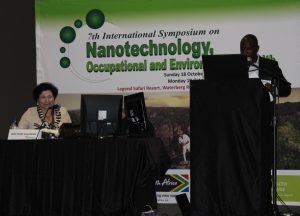What does the exposure to these nanoparticles in the long run mean to our health?
News category: Newnano
 The Deputy Director-General of Technology Innovation at the Department of Science and Technology, Mr Mmboneni Muofhe, delivered the opening address at the 7th International Symposium on Nanotechnology, Occupational and Environmental Health, the first to be held in South Africa and the continent.
The Deputy Director-General of Technology Innovation at the Department of Science and Technology, Mr Mmboneni Muofhe, delivered the opening address at the 7th International Symposium on Nanotechnology, Occupational and Environmental Health, the first to be held in South Africa and the continent.
He highlighted some challenges humanity faces and the role science, technology and innovation has played in providing solutions. “To date, the world has in many respects become a better place as scientific discoveries have improved the quality of lives of many.”
He however reiterated the importance of conducting scientific research responsibly. Given the fast pace at which science is advancing, he observed that regulation and policy-making has lagged behind significantly, and, as such the burden of ethical conduct in scientific endeavours resides more with scientists.
He said policy making is not coping. “We have to respond to what science is doing and in most cases we are very late,” he added.
“As a result, a huge responsibility lies upon all of us that are sitting here as scientists in terms of making sure that when we talk science and scientific development, we are actually talking responsible science.”
He said science is about development and empowerment, and scientists need to communicate their research and share the value and the relevance of science into society.
“We therefore need to be very mindful of not leaving everybody behind, while we are thousand miles ahead. That doesn’t help us,” he added.
He said that nanotechnology is an emerging area because there are so many questions that need to be answered, such as what the exposure to these nanoparticles in the long run means to our health.
“We still have to figure out how we can continue safely to ensure that those who are exposed to nanoparticles a on daily basis don’t risk their health while in the process of trying to ask the fundamental questions around what this small particle can actually do to improve our livelihood?”
He said the biggest question is “how do we make sure that people are aware of the risks associated with nanotechnology, if there are risks, and when there are no risks how do we communicate that and share information with society”.
He said the department continues to assess the potential risks of nanomaterials to humans and environment, because “when we are gone somebody will have to inherit this planet we are living in”.
“So, while we are looking at nanotechnology to assist in areas of service provision such as sanitation, environmental management, drug delivery and diagnostics, just to mention a few, we need to be mindful that this planet we live in must be handed over to the next generation in an inhabitable state.”
“A lot of people need to know what nanotechnology is all about. One of the things that we need to do as a country is to attract young people into sciences. They can only do so if we excite them and they have a sense of what science can do for them,” he added.
He also highlighted that the South African government through the DST has invested significantly in establishing a strong foundation for nano-innovation which included the development of human capacity, setting up of state of the art nano facilities and establishing strong international collaborative networks.
He indicated that the Department was now moving to fast-track nano-innovation and commercialisation of some of the outcomes of the previous investments.
Mr Muofhe said, as government, they need to be advised. He further said industry needs to know what nanotechnology can do for them.
The 7th International Symposium on Nanotechnology, Occupational and Environmental Health provided a scientific forum for researchers and practitioners to present and discuss the latest research on occupational and environmental health issues and risks associated with nanotechnology.
The identification of risks associated with nanotechnology and the mitigation of those risks forms the risk assessment aspect of nanotechnology. The symposium provided a platform to the South African and international researchers for presenting and accessing the generated knowledge, through targeted research, on specific and relevant nanotechnology issues pertaining to occupational health, safety and the environment.
